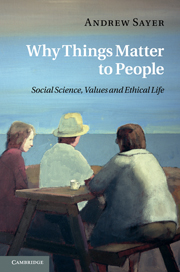Book contents
- Frontmatter
- Contents
- Acknowledgements
- 1 Introduction: a relation to the world of concern
- 2 Values within reason
- 3 Reason beyond rationality: values and practical reason
- 4 Beings for whom things matter
- 5 Understanding the ethical dimension of life
- 6 Dignity
- 7 Critical social science and its rationales
- 8 Implications for social science
- Appendix: Comments on philosophical theories of ethics
- References
- Index
7 - Critical social science and its rationales
Published online by Cambridge University Press: 05 June 2012
- Frontmatter
- Contents
- Acknowledgements
- 1 Introduction: a relation to the world of concern
- 2 Values within reason
- 3 Reason beyond rationality: values and practical reason
- 4 Beings for whom things matter
- 5 Understanding the ethical dimension of life
- 6 Dignity
- 7 Critical social science and its rationales
- 8 Implications for social science
- Appendix: Comments on philosophical theories of ethics
- References
- Index
Summary
Introduction
If our relationship to the world in everyday life is one of concern, what is it in social science? Many social scientists would say it is different: it is to describe, understand and explain, and not to evaluate or judge. I have already dealt with the view that values and evaluation are a contaminant in social science and argued that, on the contrary, that they are a necessary, indeed invaluable, part. Although social science is directed to understanding and explanation rather than deciding how to act (practical reason), we have to be evaluative if we are to describe, understand and explain social life adequately (recall the argument about thick ethical concepts). Further, actors' own accounts of their situation face social scientific accounts both as objects and rivals; while social scientists need to describe actors' accounts as fairly as possible, they also frequently have to decide how far they are adequate. Is the racist's explanation of the performance of Afro-Caribbean origin children in British schools correct? Do the actors understand everything about their situation, or are there respects in which they misunderstand and misrepresent them? In seeking the most adequate explanation of ethnic differences in educational performance, a social scientist cannot sit on the fence, and insofar as her accounts differ from those that inform and guide actors' practice, they are inescapably critical of them.
- Type
- Chapter
- Information
- Why Things Matter to PeopleSocial Science, Values and Ethical Life, pp. 216 - 245Publisher: Cambridge University PressPrint publication year: 2011



